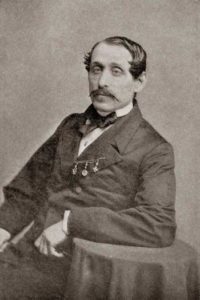
Louis Gottschalk
*Louis Gottschalk was born on this date in 1829. He was a white-American classical pianist and educator.
Born in New Orleans in 1829, Louis Moreau Gottschalk grew up in a neighborhood of Creole music with African Caribbean rhythms and melodious folk songs. These would later become a characteristic ingredient of racial and cultural intersectionality in much of his music. The house where he was born still stands at the southwest corner of Esplanade and Royal Streets in New Orleans. His musical career started in this diverse place, eventually leading to international fame. Known as the Chopin of Creole, he was exposed to music through his Grandmother Buslé and his nurse Sally, both Black natives of Saint-Domingue.
Gottschalk's informal début was at the (then) new St. Charles Hotel in 1840, where he became an instant success. In 1842, he left the United States for Europe for the classical training required to achieve his musical goals. While such professionalism in a 13-year-old typically results from the parents' ambitions, Gottschalk's letters show that he was the driving force. In a letter to his mother, he wrote, "I expect that in two years or perhaps less, I shall be earning a living on my own."
Gottschalk had a bumpy start in Europe when the Conservatoire in Paris rejected his application. He then studied privately with Karl Hallé, Camille-Marie Stamaty, and Pierre Malenden (the latter teaching composition). In the years to follow, he built a first career as a pianist virtuoso, prompting Frédéric Chopin to predict that Gottschalk would soon become one of the foremost pianists of the century. Despite his success in Europe, Gottschalk was skeptical of European musical life. He ridiculed the cult of the genius and the grotesque idiosyncrasies developed by some of his fellow white-European pianists.
In 1853, Gottschalk returned to the United States from an environment he regarded as being dominated by egotism and vanity. Re-adjusting to American culture seems to have been accompanied by some problems in the years to come; he would travel extensively throughout the United States and Canada to earn a living. In 1854, he also spent an extensive period in Cuba, and his musical interest gradually shifted towards Central and South America. In the 1860s, he became a significant figure in American musical life.
In September 1865, his career took a sharp turn when Gottschalk had to leave the United States after a scandal about his relationship with a student at Oakland Female Seminary. Gottschalk left the country for what would become his last tour. During this time, he traveled to Santiago de Chile, Buenos Aires, and Rio de Janeiro. His concerts were tremendously successful across South America and sometimes took the form of "monster concerts" involving up to 650 performers. Louis Moreau Gottschalk died on December 18, 1869, in Tijuca (Brazil), three weeks after collapsing during one of his concerts. (c) 2001 by Axel Gelfert
Glenn Gould - The Ecstasy and Tragedy of Genius.
Peter F. Ostwald. W. W. Norton & Company. 1997.
ISBN 0393040771 (hardcover), 0393318478 (paperback).